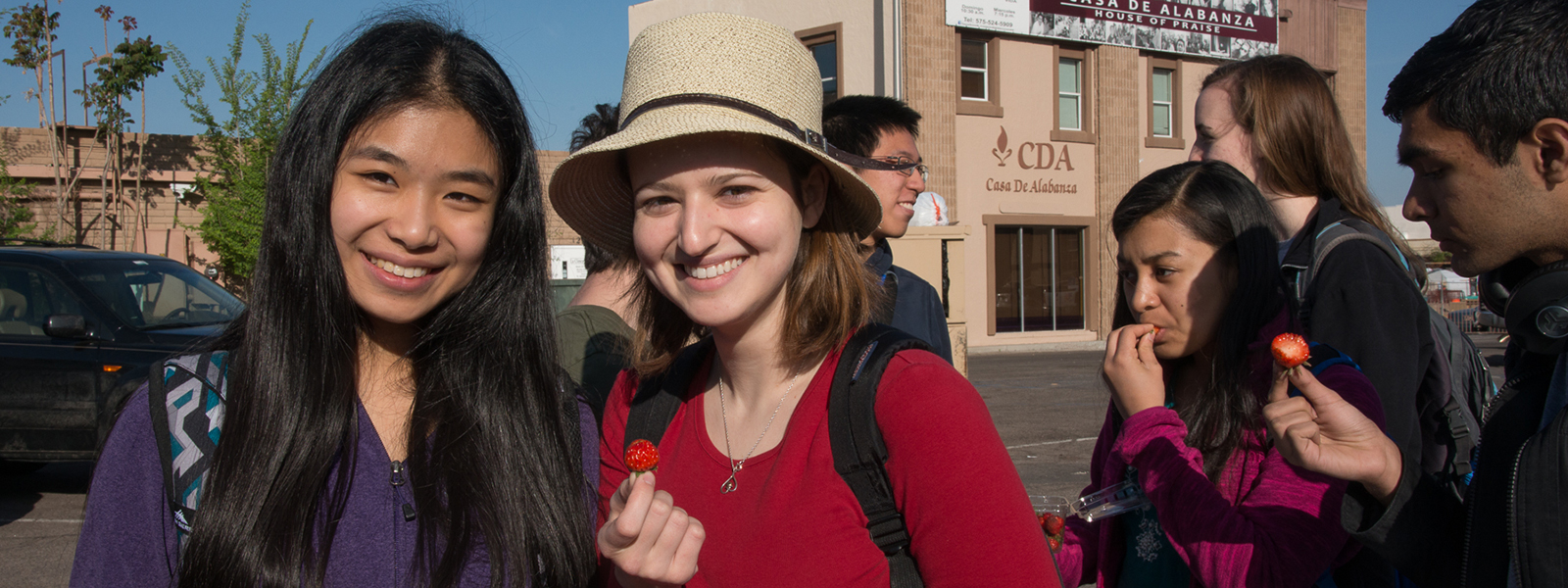
27 Apr 2016 In The Tech: Vivian Zhong on “Seeking the Culture in Agriculture”

Author: Vivian Zhong, Class of 2019
Originally posted at http://thetech.com/2016/04/27/terrascope-new-mexico-trip ·
Seeking the culture in agriculture
Investigating food security in the New Mexican heartlands
Last semester, the freshmen in 12.000 (Solving Complex Problems) embarked on a mission to feed the entire world. We didn’t quite accomplish that, but we did learn a lot about food security in the face of a changing climate. As an investigative and educational follow-up field trip, our class journeyed over spring break to a place that faces a troubling heap of challenges in guaranteeing food amidst the challenges of climate change: New Mexico.
A land of chile and tumbleweeds, and the incubator for many wonderful friendships, it is a land so wholly different from anywhere on the East Coast that it might as well be a different country altogether — which was just as well, since this was supposed to be a year where we went international for the Terrascope spring break trip.
If you asked any student who went on the trip for a one-sentence summary of what we did in New Mexico, the answer would probably be along the lines of, “We talked to a lot of farmers.” A LOT of farmers, all selectively chosen by our excellent trip supervisors. I lost count somewhere around Farmer #14 on Day 3, but what they said stuck with me.
The extraordinary part of the experience, I think, was that every single farmer had something quite different to say. We held respectful conversations with climate change skeptics and organic farming advocates alike, and every farmer had a thought-out reason for their methods, whether they used genetically-modified or heirloom seeds, or embraced or refused herbicides.
In the same day, we heard both “organically-farmed hay harvests often contain a high percentage of unusable weeds” as well as “organic farming reduces the use of harmful pesticides.”
Given my personal interest in the use of genetically-modified crops, I was especially curious to understand why farmers are so often against them. In some, there were obvious signs of misinformation (seeds collected from GM crops are not all sterile); in others, subjectivity seeped into reason (“they don’t taste as good”); but concern over the business practices of GM companies is certainly not unfounded.
In addition to exploring different cultures of farming, we explored different cultures of life with the Pueblo and the Navajo Native Americans. Tribe members welcomed us into their homes, their community meetings, and their spiritual ceremonies.
One of the revelations that struck me most was their acceptance and incorporation of Catholicism, a religion which by all accounts, including their own, was forced upon them by the colonial Spanish. And I cannot help but wonder how the elders reconcile the scientific discovery that Native Americans came over the land bridge from Asia with long-held oral traditions that their people had lived in their ancestral land since the very beginning.
As foreign as the land might be, the people were so warm and welcoming that for the most part, I felt quite at home. Between the many gracious hosts that our awesome trip advisors found, we shared meals of freshly-pulled carrots, homemade fry bread, and improvised blue corn pancakes; and at a Catholic missionary in the heart of the Navajo Nation (found through Airbnb), I got the bunk bed, summer camp experience I never had.
Despite typically starting the day at the outrageously early hour of 7 a.m. and being either out on the road or in the field till sundown, the 10-day trip was still far less tiring than an average MIT week. Breathing nature, going places, speaking with strangers — all very invigorating activities after long weeks of psets and exams and deadlines.
Speaking with people was, I think, the keystone of the trip: with others as well as with ourselves. Despite a whole semester with my Mission classmates, our communication was mostly class-related and we never really got to know each other. One spring break together, however, and already we were inseparable — our first trip reunion occurred in Next dining the night we got back to MIT. I think I may have finally found a community where I am quite comfortable — because nothing makes you more comfortable with each other than sharing a van and a playlist for a week’s ride through the desert.
All that said, I don’t think I’m particularly inclined to return to New Mexico. I like it when my days don’t have winter-to-summer temperature gradients, when the dust is not in my hair, and when the wind and the sun are not turning my face into sandpaper. But I do think that this was one of the best trips I’ve ever embarked on, and certainly far more memorable than a family vacation to Miami.
We can discuss and solve problems of food security all we like here at MIT, but it is absolutely vital to speak to the farmers and the consumers themselves in order to truly know, or at least begin to truly know, how we can help them from our faraway classrooms and laboratories.
Vivian Zhong is a member of the Class of 2019.


